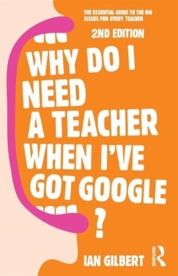A Brief History of the Written Exam
An extract from Ian Gilbert's best-selling book Why Do I Need a Teacher When I've got Google? entitled, 'Exams: So Whose Bright Idea Was That?'
"In China of 2000 years ago, being a state official was a great privilege that brought with it access for you, your friends and families to power, prestige and the sort of wealth that government contracts could bring.
Originally the only way you could be part of such an elite was, basically, already to be part of this elite.
A system of relationships and recommendations known as ‘Ta you guanxi’’ translated as ‘He has some connections’ was what determined how received the top jobs and who didn’t.
But then in 85AD Emperor Zhang of Han set out an annual quota of officials drawn from erudite Confucian scholars and this selection process began to involve not just who you knew but what you knew.
This selection process now included a procedure called ‘shece’ or ‘lot strip’ in which candidates drew bamboo strips at random on which was written an examination question.
'People of Consequence'
It is this combination of the testing of prior knowledge balanced with the pursuit of a fairer way of doing things that appealed to the educational pioneers who were looking to open up education to the burgeoning middle classes in mid-19th century England.
A growing demand for education meant a growing demand for quality education, the sort of education that would lead to university and a prestigious and high-earning career but questions were being asked about the suitability and competence of schoolmasters.
Good schools knew they needed an objective and independent way of assessing their worth and some were already seeking out reports on their competence by impartial ‘people of consequence’, the forerunners of our lay inspectors today, where someone trained as a postman can tell a post-graduate professional with twenty years experience if they are doing a good job or not.
These schools saw their opportunity for benefiting from the reflected glow from the halo of the indubitable auspices of the universities of Oxford and Cambridge.
It was a way of guaranteeing the impartial and academically rigorous assessment of their quality following what was known as the ‘Exeter experiment’ of 1857.
The ‘Exeter experiment’ was a competitive public exam for local schoolboys set up at the behest of the Bath and West of England Society for the Encouragement of Agriculture, Arts, Manufacture and Commerce (a sort of Young Farmers meets Chamber of Commerce meets Rotary Club meets Local Operatic Society sort of group).
Caps, Gowns and Hoods
It was masterminded by two unlikely accomplices, Frederick Temple, a double first from Baliol College, Oxford who had worked at the examinations department there and had gone on to become the H.M. Inspector of Training Schools and one Thomas Acland, a Tory M.P. for West Somerset and a gentleman farmer.
Both were vexed by the question of providing a better quality education for the middle classes and the idea of using the sleepy West country city of Exeter as test bed for trialing a new sort of public examination, under the auspices of Temples connections back at Oxford University.
This was the first time that Oxford had held examinations for ‘candidates who are not members of the University’ and the occasions merited a visit by the great and the good, complete with caps, gowns and hoods.
In fact, in the early years of these ‘local’ exams the chief examiner would travel in full academic regalia by train carrying a locked box with the exam papers inside.
These weren’t the first school exams, though, as there is evidence of diocesan visits in the 16th and 17th century to test children’s attainment and to consult with the teaching staff about their practice in some schools.
The Exeter experiment, however, was a gauntlet of educational quality that was picked up by both Oxford and Cambridge in the years to come, followed by other universities such as the Northern ones with the forming of the Joint Matriculation Board in 1903.
By 1917 the universities had a complete grip on the examination system in the UK.
No one seems to disagree with the idea of an independent verification of how well things are being taught and how well these things are being learned.
'Public, Oral and In Latin'
Nor did there seem to be much discussion as to the nature of what an exam looked like, namely a printed set of questions to which the students replied in writing, in silence and behind closed doors.
Yet six hundred years earlier, as described by Christopher Stray of Swansea University in a fascinating paper entitled The Shift from Oral to Written Examination: Cambridge and Oxford 1700-1900, in the Oxford and Cambridge of medieval times examinations were ‘public, oral and in Latin’. He quotes a writer named Rouse Ball who in 1889 said:
‘We are perhaps apt to think that an examination conducted by written papers is so natural that the custom is of long continuance. But I can find no record of any (in Europe) earlier than those introduced by Bentley at Trinity in 1702’.
Stray points out that he thinks Rouse Ball is wrong and that there is a case for written exams being part of the overall process dating back to 1560.
However, what is clear is that the most widespread means of assessing an individual’s learning was through a good old fashioned heated debate between a number of learned people all at the same time and lasting for two hours or more.
It was only towards the end of the 18th century that the piecemeal movement was made away from oral examinations to written ones and it wasn’t until 1828 that all papers were in printed form rather than being dictated.
Wooden Spoon
It was also around this time that the poor chap who came bottom of the heap when it came to the competitive system of degree honours, that is to say the one who received a third but only just, was rewarded with a special honour all of his own.
As he was receiving his degree from the vice chancellor, a large wooden spoon was lowered from the gallery by his fellow students.
Seventy five years later organised rugby came to Wales.
Despite differences in motivation for moving away from the oral exam and the viva voce approach, one factor was relevant for both institutions. The growth in the middle classes fed by the success of the Industrial Revolution and Great Britain’s economic and academic expansion meant that were simply too many students to be able to run successfully any sort of oral assessment.
This meant, in an echo of the industrial processes going on outside the hallowed halls, that a system of sitting students down in large numbers in an ‘exam factory’ model made a great deal more sense from an efficiency point of view.
Poetic Tradition
>Which is great if you are from a wealthy family with a decent education behind you but where does that leave students for whom the written word has not been their main means of communication?
For example, maybe your school has a growing Somali population, after all, the UK is home to the largest Somali population in Europe with Cardiff being the single largest Somali population in the UK.
Estimates are there are up to 250,000 Somalis living in the UK, a six-fold increase from 2001 near enough. But did you know that, despite a particularly strong poetic tradition, Somali culture is predominantly an oral one with no official written language until 1972?
Willy Russell, the Liverpool-born playwright, was an English teacher for a while but felt that the working class students he was teaching were being unfairly penalised as the oral tradition of their backgrounds was ignored as they had to sit – and often fail – exams that were in purely written form.
She Knows Her Bernard Shaw
“Schools fail most of the people most of the time,” he is quoted as saying in an interview with The Guardian, which is quite a broad generalization but has its roots in his own experience at school, leaving with just one O-level.
He loves what he has called ‘The poetry of common speech’ using his time in his first job after leaving school as a woman’s hairdresser to listen to the wit and genuine wisdom of the ladies of Liverpool, ‘working-class people who can talk about Jean-Paul Sartre. She might get elements of it wrong, but she knows her Thomas Hardy and she knows her Bernard Shaw,' as he described these prototype Educating Ritas.
In recent years there has been a considerably efforts made in opening up the possibility of academic success without recourse to the written exam, especially with a pendulum that swung towards coursework, but which seems to be swinging back again.
A report in The Guardian in August 2009 described how boys overtook girls in one fell swoop in the GCSE maths exams, something they put down to the removal of coursework.
I remember reading once that exams favoured the so-called 'male-type brain', geared as it was to sudden bursts of activity followed by periods of inactivity sitting by the fire digesting what it had just caught, telling stories and passing wind whereas the 'female-type brain' was better suited to lower energy but more sustained effort over time.
Reflecting on my time during the exam seasons I endured at school and university and given that I quite enjoyed the exam itself, if not the revision, and did well, I would tend to concur.
But then my son has just got himself into Durham University with a B-Tech qualification from a local college that was entirely coursework based after rejecting a more academic exam-oriented VIth form college.
What’s more, there is even a UK school that has rejected the exam factory model completely and still managed to get students into university.
The Tyranny of Syntax
What does this mean for the 21st century teacher?
The written exam is part of what I call the ‘tyranny of syntax’, the idea that learning has to be written down in sentence form to count.
But this is a relatively modern invention.
Nor does it suit everyone although it obviously suited you otherwise you wouldn’t be qualified to do the job you are doing now.
You may well have to teach children to ‘jump through the hoop’ of the written exam as it were - exam technique, how to revise, stress control, that sort of thing.
But don’t let the hoop take over.
Ensure there are plenty of opportunities for exploring the ‘oral traditions’ of your students, wherever they are from, and do not be too sucked into the academic snobbery associated with the written exam hegemony, after all, Shirley Valentine may well have done better in pre-19th century than you think.

Extract adapted from Ian Gilbert's best-selling and prescient book Why Do I Need a Teacher When I've Got Google, first published in 2012.

To find out more about booking Ian Gilbert for your school, college or organisation call us on 01267 211432 or drop us an email on learn@independentthinking.co.uk.
Enjoy a free consultation. Make a booking.
Haggle a bit. All acceptable.
Give us a call on +44 (0)1267 211432 or drop us a line at learn@independentthinking.co.uk.
We promise to get back to you reassuringly quickly.

About the author
Ian Gilbert
Ian Gilbert is an award-winning writer, editor, speaker, innovator and the founder of Independent Thinking. He has lived and worked in Europe, the Middle East, South America and Asia and is privileged to have such a global view of education and education systems.